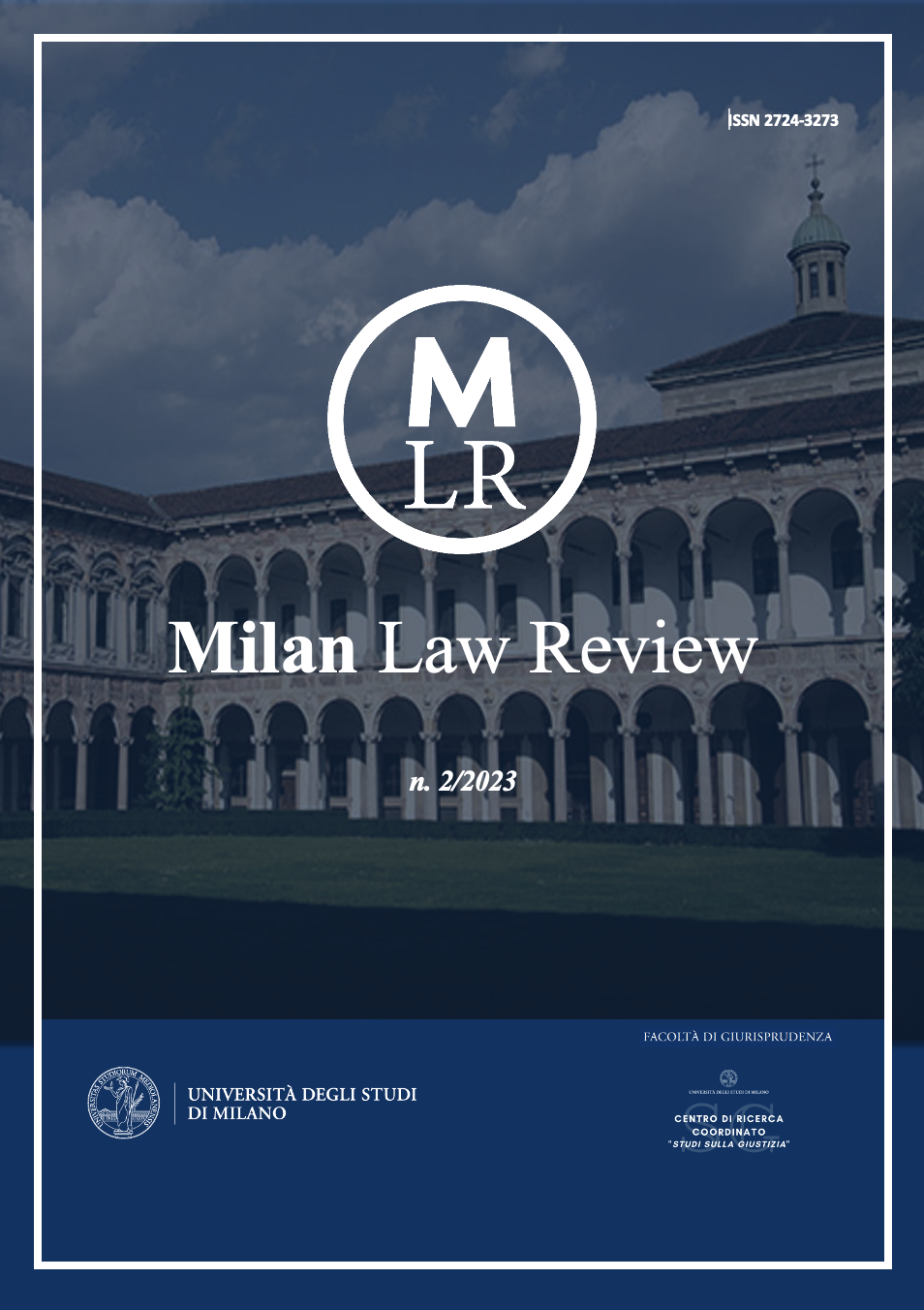Discussing epistemic injustice: expertise at trial and feminist science
DOI:
https://doi.org/10.54103/milanlawreview/22189Parole chiave:
ingiustizia epistemica, epistemologia sociale, saperi esperti, epistemologia femministaAbstract
Il contributo discute la nozione di ingiustizia epistemica, con specifico riferimento all’ingiustizia di genere, nata all’interno degli studi di epistemologia sociale, testandone le potenzialità applicative in ambito giudiziario. In particolare, la prova scientifica potrebbe, qualora utilizzata dal giudice con atteggiamento deferente, provocare ipotesi di ingiustizia epistemica, sia nella fase di formazione del sapere scientifico mobilitato in giudizio, sia nel suo utilizzo.
Downloads
Riferimenti bibliografici
S. Agosta, G. Sartori, The Autobiographical IAT: A Review, in Frontiers in Psychology, 4, 2013, p. 165-176
L. Algeri, Neuroscienze e testimonianza della persona offesa, in Rivista italiana di medicina legale, 2012, p. 903 s.
E. Anderson, Epistemic Justice as a Virtue of Social Institutions, in Social Epistemology, 2012, 26, 2, p. 163-173
E. Anderson, Feminist Epistemology and Philosophy of Science, in Zalta E. N. (ed.), The Stanford Encyclopedia of Philosophy (Spring 2011 Edition), URL =
L.M. Antony, Quine as Feminist: The Radical Import of Naturalized Epistemology, in L. A.C. Witt (ed.), A Mind of One’s Own: Feminist Essays on Reason and Objectivity, Westview Press, Boulder e Oxford, 1993, p. 185-225
B. Casalini, Privilegi, svantaggi strutturali e vulnerabilità: tra ingiustizie discorsive e ingiustizie epistemiche, in About Gender, 2022, vol. 11, 21, p. 208-228
Committee on the Elimination of Discrimination against Women, Views adopted by the Committee under article 7 (3) of the Optional Protocol, concerning Communication No. 148/2019
B. Crenshaw, Mapping the Margins: Intersectionality, Identity Politics, and Violence against Women of Color, in Stanford Law Review, 1991, 43, 6, p. 1241-1299
M. Damaska, The Faces of Justice and State Authority. A Comparative Approach to th Legal Process, Yale University Press, New Haven, 1991
K.R. Foster, P.W. Huber, Judging Science. Scientific Knowledge and the Federal Courts, The MIT Press, Cambridge (MA)-London, 1999
M. Foucault, Les anormaux: cours au Collège de France (1974-1975), Paris, Gallimard, Paris, 1999, English translation Abnormal. Lectures at Collège de France (1974-1975), Picador, New York, 2004
N. Fraser, Fortunes of Feminism. From State-Managed Capitalism to Neoliberal Crisis, Verso, London-New York, 2013
M. Fricker, Epistemic Injustice. Power and the Ethics of Knowing, Oxford University Press, Oxford, 2007
M. Fricker, Evolving Concepts of Epistemic Injustice, in I.J. Kidd, J. Medina, G. Pohlhaus (eds.), Routledge handbook of epistemic injustice, Routledge, New York, 2017, p. 53-60
J. Gardner, The Gist of Excuses, in Buffalo Criminal Law Review, 1998, vol. 1, n. 2, p. 575-598
A.G. Greenwald, D. Mcghee, J. Schwartz, Measuring individual differences in implicit cognition: The implicit association test, in Journal of Personality and Social Psychology, 1998, vol. 74, p. 1464-1480
S. Haack, Epistemological Reflections of an Old Feminist, in Reason Papers, 1993, vol. 18, p. 31-42
S. Haack, Federal Philosophy of Science: A Deconstruction - And a Reconstruction, in New York Universal Journal of Law and Liberty, 2010, 5, p. 394-435
S. Haack, Science is Neither Sacred nor a Confidence Trick, in Foundation of Science, 1995/96, n. 3, p. 323-335
D. Haraway, Situated Knowledges, in Simians, Cyborgs, and Women, Routledge, New York, 1991
S. Harding, The Science Question in Feminism, Cornell University Press, Ithaca-London, 1986
H.L.A. Hart, Legal Responsibility and Excuses, in Id., Punishment and Responsibility: Essays in the Philosophy of Law (1968), Oxford University Press, Oxford, 2008
B. Hooks, From Margin to Center, South End Press, Boston, 1984
K. Intemann, 25 Years of Feminist Empiricism and Standpoint Theory: Where Are We Now?, in Hypatia, 2010, vol. 25, n. 4, p. 778-796
K. Intemann, Feminist Standpoint, in L. Disch & M. Hawkesworth (eds.), The Oxford Handbook of Feminist Theory, Oxford University Press, Oxford, 2016
S. Jasanoff, Science at Bar Science at Bar. Law, Science and Technology in America, Harvard University Press, Cambridge-London, 1995
S. Jasanoff, Science and Public Reason, Routledge, New York, 2012
S. Jasanoff, States of Knowledge. The co-production of Science and Social Order, Routledge, New York, 2004
H. Kantorowicz, Cino da Pistoia ed il primo trattato di medicina legale, in Archivio storico italiano, 1906, vol. 37, p. 115-128
H. Kumper, Learned Men and Skillful Matrons: Medical Expertise and the Forensics of Rape in the Middle Ages, in S.M. Butler, W.J. Turner (eds.), Medicine and the Law in the Middle Ages, Leiden et al., 2014, p. 88-108
J. Lackey, Credibility and the distribution of epistemic goods, in K. McCain (ed.), Believing in accordance with the evidence: New essays on evidentialism, Springer, Cham, 2018, p. 145-168
J. Lackey, False confessions and testimonial injustice, in Journal of Criminal Law & Criminology, 2020, vol. 110, p. 43-68
C. Lombroso, G. Ferrero, La donna delinquente, la prostituta e la donna normale (1893), Et. al., 2009
E. Machery, Do indirect measures of biases measure traits or situations?, in Psychological Inquiry, 2017, vol. 28, n. 4, p. 288-291
J. Medina, M.S. Whitt, Epistemic activism and the politics of credibility. Testimonial injustice inside/outside a North Carolina jail, in H. Grasswick, N.A. Mchugh (eds.), Making the case: Feminist and critical race philosophers engage case studies, SUNY Press, Albany, 2021, p. 293-324
K. Orit, To Kill a Songbird: A Community of Women, Feminist Jurisprudence, Conscientious Objection and Revolution in A Jury of Her Peers and Contemporary Film, in Law and Literature, 2007, vol. 19, n. 3, p. 357-376
A. Páez, J. Matida, Editorial of dossier “Epistemic Injustice in Criminal Procedure”, in Revista Brasileira de Direito Processual Penal, 2023, vol. 9, n. 1, p. 11-38
D. Ruggiu, Inescapable Frameworks: Ethics of Care, Ethics of Rights and the Responsible Research and Innovation Model, in Philosophy of Management, 2020, 19, p. 237-265
G. Sartori, S. Agosta, C. Zogmaister, S.D. Ferrara, U. Castiello, How to Accurately Detect Autobiographical Events, in Psychological Science, 2008, 19, p. 7727-80
A. Simone, I. Boiano, A. Condello (eds.), Legal Feminism: Italian Theories and Perspectives, Routledge, New York, 2022
Dowloads
Pubblicato
Come citare
Fascicolo
Sezione
Licenza
Copyright (c) 2023 Milan Law Review

Questo lavoro è fornito con la licenza Creative Commons Attribuzione - Non commerciale - Non opere derivate 4.0 Internazionale.




